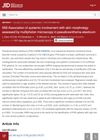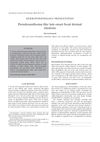Pseudoxanthoma Elasticum: Progress in Research Toward Treatment - Summary of the 2012 PXE International Research Meeting
TLDR Significant progress was made in understanding PXE, but effective treatments are still needed.
The 2012 PXE International Research Meeting highlighted significant advances in understanding pseudoxanthoma elasticum (PXE), a rare disorder caused by ABCC6 gene mutations. Key findings included the identification of nearly 600 ABCC6 mutations, the development of knockout mouse models, and the role of vitamin K deficiency. Warfarin was found to accelerate ectopic mineralization in mice, suggesting risks for PXE patients on warfarin. Gender differences in disease manifestations were noted, and magnesium supplementation showed promise in preventing mineralization, leading to a clinical trial. Researchers also explored molecular approaches to correct ABCC6 deficiency, emphasizing the need for continued research to develop effective treatments.




